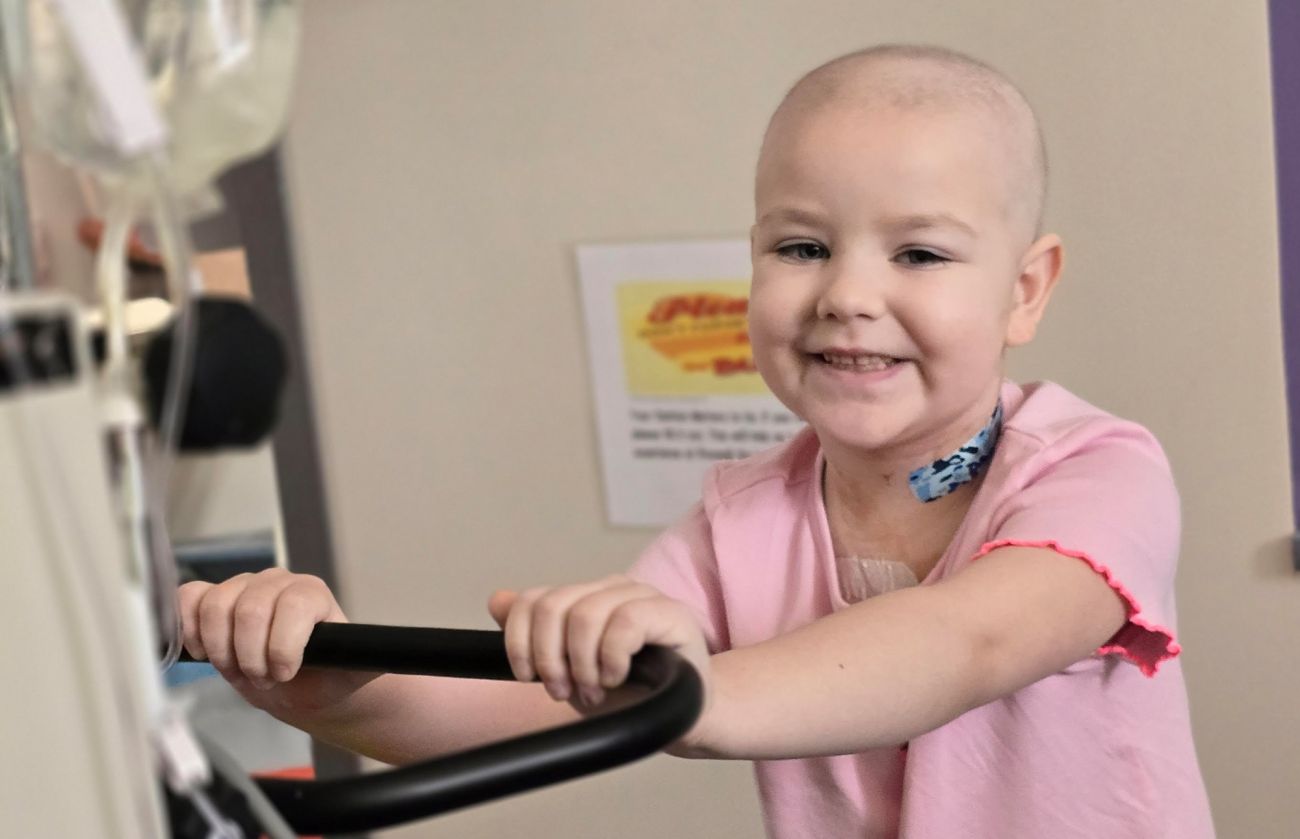Roswell Park oncologists say survival rate of rare mutation is improving
- CAR T-cell therapy involves engineering patient’s own cells
- This immunotherapy is less toxic than traditional chemotherapy
- Recommended for even the youngest cancer patients
NOTE FOR MEDIA: Video, photos and additional resources available here
BUFFALO, N.Y. — The most common cancer in children, leukemia, may have met its match. Roswell Park Comprehensive Cancer Center is at the forefront of a personalized cancer treatment option, called CAR T-cell therapy, which transforms a patient’s own cells into cancer-fighting supercells, often without invasive surgery, offering new hope for the possibility of a long, healthy life.
On April 29, 2024, Bryn Ailinger was diagnosed with precursor B-cell acute lymphoblastic leukemia. Because her cancer cells harbored a rare and aggressive mutation, TCF3-HLH, standard chemotherapies and surgeries proved ineffective.
“You think the worst immediately,” says Justin Ailinger, Bryn’s father. “I didn't know if I was going to have a daughter by the end of the year.”
Bryn’s care team from the Roswell Park Oishei Children’s Pediatric Cancer and Blood Disorders Program then presented CAR T-cell therapy as an option, and today, the six-year-old is in remission, ready for first grade.
“I look at her, and I see a miracle,” says Meghan Higman, MD, PhD, a pediatric oncologist at Roswell Park specializing in blood cancers. “That's because this kid five years ago wouldn't have been alive, and now she's alive, thriving and just, wow.”
Dr. Higman and her Roswell Park colleagues recommend CAR T-cell therapy even for their youngest patients who can benefit — not only for its efficacy but also its safety compared to chemo.
“Chemotherapy is so toxic,” says Ajay Gupta, MD, MS, a pediatric oncologist at Roswell Park specializing in sarcomas. “We're trying to make it so that patients have a better quality of life even after they're done with treatment. And so I feel strongly that approaches that can change the immune system, like CAR T-cells, can actually do this without causing long-term side effects.”
CAR T-cell therapy involves extracting T cells, a type of immune cell, from a patient’s blood and then taking them into a specialized lab. From there, scientists engineer the cells to recognize and kill cancer cells. The cells are then duplicated by the millions and replaced in the patient's body through an IV infusion.
The cells are processed in Roswell Park’s newly expanded Good Manufacturing Practice Engineering & Cell Manufacturing Facility (GEM), one of the largest facilities of its kind in the United States. It contains 20 sterile rooms across two buildings, marking a transformative step for cancer research and treatment.
“I hope for other children that have this mutation pop up that they're able to collaborate with Dr. Higman and the others, and try these same therapies that were successful for Bryn,” Ailinger says. “I hope that she's able to help save lives for other children as well that go through this.”
The results of CAR T-cell therapy so far have been highly promising, with acute leukemia remaining undetectable in more than 80 percent of patients following their treatment. As of now, CAR T-cell therapy is FDA-approved only for certain types of blood cancer, but Roswell Park is also working to expand the use of the treatment against other cancers — from rare types like sarcoma to the second most common cancer in kids, brain tumors.
“Our next job is how can we get them into more solid tumors or into places that it's hard to get to because the immune system doesn't really get there as well as it should,” says Dr. Higman, who also holds appointments with the Jacobs School of Medicine and Biomedical Sciences at the University at Buffalo and UBMD Physicians Group. “Like the brain — chemo often doesn't get there because of the way that the blood-brain barrier works. So what we really need to do is build more things to keep it around for everybody.”
To learn more about the unique resources available at the only National Cancer Institute-designated comprehensive cancer center in Upstate New York, as well as the capabilities and expertise housed within the Roswell Park GMP Engineering & Cell Manufacturing Facility (GEM), visit roswellpark.org/gmp.
###
From the world’s first chemotherapy research to the PSA prostate cancer biomarker, Roswell Park Comprehensive Cancer Center generates innovations that shape how cancer is detected, treated and prevented worldwide. The Roswell Park team of 4,000+ makes compassionate, patient-centered cancer care and services accessible across New York State and beyond. Rated “Exceptional” by the National Cancer Institute, Roswell Park, founded in 1898, was one of the first NCI-designated comprehensive cancer centers in the country and remains the only one in Upstate New York. To learn more about Roswell Park Comprehensive Cancer Center and the Roswell Park Care Network, visit www.roswellpark.org, call 1-800-ROSWELL (1-800-767-9355) or email ASKRoswell@RoswellPark.org
Jane Rose, Media Relations Specialist
716-845-4919; jane.rose@roswellpark.org
